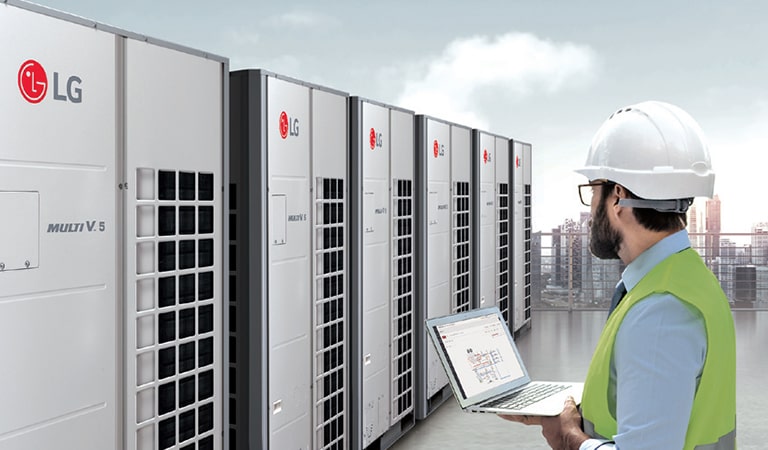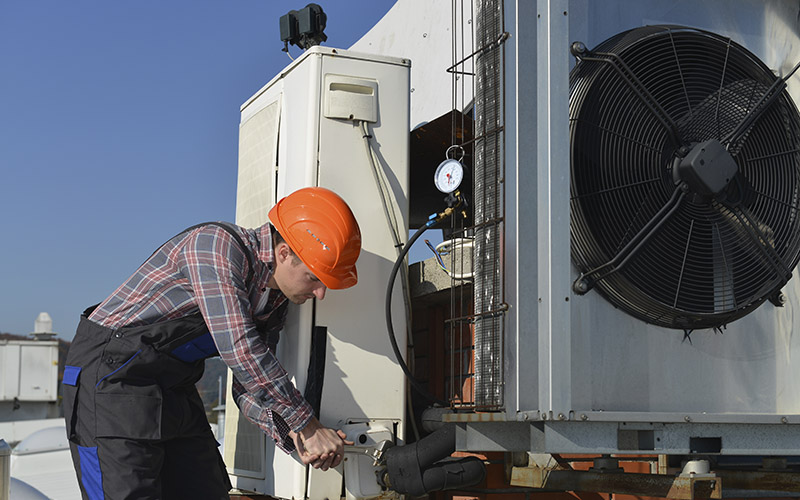Choosing In Between a Heatpump and Heater: Key Factors To Consider for Your HVAC Demands
When evaluating home heating choices for heating and cooling needs, the decision between a heatpump and a heater can be complicated. Each system offers unique advantages tailored to particular climates and energy effectiveness objectives. Understanding these differences is crucial for making an enlightened option. Secret aspects such as installment expenses and environmental influence even more make complex the option procedure. Which alternative truly straightens with one's comfort and sustainability preferences? The adhering to areas will explore these factors to consider in detail.
Recognizing Warmth Pumps: Just How They Work and Their Advantages
While several home owners think about numerous home heating choices, comprehending exactly how heatpump function and their advantages can substantially influence their decision. Heatpump run by transferring heat rather than producing it. In the wintertime, they remove heat from the outdoors air or ground and move it indoors, while in the summer, they reverse this process, cooling down the home by getting rid of heat outside. This dual performance makes them flexible for year-round climate control.One of the primary advantages of heat pumps is their energy performance. They use significantly much less power contrasted to traditional furnace, potentially resulting in reduced energy expenses (furnace replacement). In addition, warm pumps have a smaller sized carbon impact, making them an environmentally friendly option. They additionally require much less maintenance than standard systems, contributing to long-lasting price financial savings. Overall, understanding the technicians and benefits of heat pumps can aid house owners make notified choices concerning their heating and cooling down needs
Checking Out Heating Systems: Types, Procedure, and Benefits
Furnaces can be found in various kinds, consisting of gas, electrical, and oil models, each with distinctive functional mechanisms. Understanding these distinctions is important, as they influence effectiveness and heating performance. Additionally, heaters offer numerous advantages, such as regular warm result and dependability in colder environments.
Sorts of Heaters
Heating systems can vary significantly in style and procedure, with furnaces being a prominent selection amongst house owners. There are several kinds of furnaces, each utilizing different fuel resources and innovations. Gas furnaces are typical, leveraging natural gas to produce warmth effectively. Electric furnaces, on the other hand, use electric resistance to produce heat, commonly preferred for their simple installation. Oil heaters, while much less common, are effective in locations with minimal gas gain access to (heat pump replacement ooltewah tn). In addition, condensing heaters make the most of power performance by reusing and capturing exhaust gases. Each type operates through a system of warm exchangers and ductwork to distribute cozy air throughout a home. Recognizing the differences in between these furnace types is necessary for educated heating and cooling choices
Advantages of Furnaces
For homeowners looking for trusted heat throughout cold months, the benefits of heaters are considerable. Heaters supply constant heating, ensuring also temperatures throughout the home. They are specifically effective in extreme chilly, typically exceeding heatpump in frigid problems. Various types, including gas, electrical, and oil furnaces, supply flexibility to meet diverse needs and preferences.Furnaces likewise tend to have reduced first installment costs contrasted to heatpump, making them a much more available choice for many. Their durable style adds to a longer life-span, with many systems lasting over 15 years with proper upkeep. Additionally, modern-day heaters are frequently equipped with advanced innovation for improved efficiency, which can bring about decreased power expenses. Generally, heaters continue to be a trustworthy choice for efficient home heating.

Power Performance: Comparing Warmth Pumps and Furnaces
When contrasting power efficiency between heatpump and heating systems, the Seasonal Energy Efficiency Ratio (SEER) plays a necessary duty in establishing performance. In addition, a functional cost evaluation discloses the long-lasting economic effects of each system. Recognizing these variables can guide home owners in making educated decisions regarding their home heating remedies.
Seasonal Power Effectiveness Proportion
Power performance plays an important duty in the decision-making process in between heatpump and heating systems, especially when taking into consideration the Seasonal Energy Performance Proportion (SEER) This statistics procedures the cooling performance of heatpump over a whole air conditioning season, providing a standard method to review performance. Greater SEER ratings suggest better energy effectiveness, converting to lower power consumption and decreased energy expenses. In comparison, furnaces are typically evaluated making use of the Annual Gas Application Effectiveness (AFUE) score, which mirrors heating performance. When comparing these 2 systems, house owners ought to prioritize SEER ratings for heat pumps, as they straight influence overall energy cost savings and environmental sustainability. A complete understanding of SEER can significantly influence the long-term complete satisfaction and cost-effectiveness of the picked HVAC remedy.
Functional Expense Evaluation
Understanding the operational prices associated with heat pumps and furnaces is essential for homeowners reviewing their options. Warmth pumps typically use greater energy performance, converting electric energy into warm with very little waste. This results in reduced month-to-month utility bills, specifically in modest environments. On the other hand, standard heaters, especially gas models, might have lower in advance costs yet can incur higher operational costs gradually because of sustain costs and effectiveness ratings.Moreover, heatpump can function as both home heating and cooling down systems, potentially minimizing the requirement for separate a/c devices. While preliminary investments for heat pumps may be greater, their long-lasting savings in power effectiveness can make them an extra affordable choice for lots of families. Cautious analysis of neighborhood power prices is necessary to identify the most effective option.
Installation Prices: What to Anticipate for Each Furnace
Installment costs for home heating systems can differ significantly between warm pumps and heaters, influencing house owners' decisions. Heatpump generally have higher in advance installation prices, normally varying from $3,500 to $8,000, depending upon the unit dimension and intricacy of installation. This includes the outside system, indoor handling system, and required ductwork alterations. On the other hand, heaters have a tendency to have reduced preliminary expenses, balancing between $2,500 and $6,000, which can be appealing for budget-conscious property owners. Installation costs can increase if extensive ductwork is required.Moreover, the option of fuel kind for heating systems-- natural gas, propane, or electric-- can also impact setup expenses. While heatpump provide energy effectiveness, their initial financial investment might hinder some customers. Inevitably, examining setup prices along with long-term savings and efficiency will certainly assist property owners in making notified choices about their furnace.
Environment Considerations: Which System Executes Much Better in Your Area
Exactly how do climate conditions influence the efficiency of heater? The performance of warm pumps and heaters can differ greatly relying on the neighborhood environment. In modest climates, heatpump excel by efficiently transferring heat from the outside air, making them an energy-saving option. Nonetheless, their efficiency decreases in incredibly chilly temperature levels, where they might battle to remove sufficient warmth. Alternatively, heating systems, particularly gas versions, supply constant and trustworthy warm despite outdoor conditions, making them more suitable in chillier regions.In areas that experience milder wintertimes, warm click here now pumps can run efficiently year-round, giving both heating & cooling. In comparison, regions with rough wintertimes commonly profit from the effectiveness of heating systems. Ultimately, recognizing the regional climate is essential when choosing between a heatpump and a heating system, as it directly influences their operational effectiveness and general efficiency.
Maintenance Demands: Long-Term Care for Warm Pumps vs. Furnaces
While both heatpump and heaters call for regular upkeep to ensure peak efficiency, their particular demands and care regimens differ browse around this web-site substantially. Furnaces commonly require less constant interest, with annual inspections being sufficient to look for gas leakages, tidy filters, and analyze total performance. Their simpler layout frequently enables for straightforward repairs.In contrast, heat pumps necessitate semiannual upkeep because of their double function in home heating and cooling. This consists of cleaning coils, inspecting cooling agent degrees, and making certain that both the interior and outside devices work at their best. In addition, heatpump upkeep frequently includes more elaborate components, making specialist maintenance essential.Neglecting upkeep can lead to reduced efficiency and enhanced power prices for both systems. Eventually, house owners need to take into consideration these lasting care needs when choosing in between a warmth pump and a heating system, as proactive maintenance can expand the lifespan and performance of either system considerably.
Ecological Impact: Choosing a Sustainable Home Heating Option
The ecological impact of furnace is an essential evaluation for homeowners seeking lasting choices. Warmth pumps are normally a lot more energy-efficient than standard furnaces, as they transfer warm instead than generate it, considerably minimizing carbon exhausts. By making use of renewable resource resources, such as geothermal or air-source heatpump, house owners can additionally reduce their environmental footprint.On the various other hand, natural gas furnaces release greenhouse gases and add to air pollution, though they typically provide higher warmth result. Improvements in innovation have led to the growth of high-efficiency furnaces that decrease emissions.Ultimately, picking a home heating system entails evaluating efficiency versus ecological influence. Homeowners are encouraged to mirror on local power sources and incentives for eco-friendly systems, ensuring a choice that aligns with both individual comfort and environmental obligation. The choice impacts not only prompt convenience yet additionally long-term sustainability and ecological health and wellness.
Frequently Asked Concerns
The Length Of Time Do Heat Pumps and Furnaces Commonly Last?
The life-span of heatpump usually ranges from 15 to 20 years, while furnaces can last between 15 to thirty years. Normal maintenance substantially affects their long life and effectiveness in providing heating options.
Can I Use a Warmth Pump in Exceptionally Cold Climates?
Warmth pumps can operate in incredibly cool climates, however their efficiency diminishes as temperatures decline. In such problems, supplemental heating resources may be essential to preserve comfy indoor temperatures and guarantee peak efficiency.

What Is the Sound Level of Warmth Pumps Versus Furnaces?
The sound degrees of heatpump and heating systems differ significantly. Generally, heatpump run more quietly than standard heaters, making them preferable for those conscious appear, while furnaces might generate louder operational noises throughout heating cycles.
Are Heat Pumps Suitable for Both Home Heating and Air conditioning?
Heat pumps are indeed suitable for both heating & cooling (heat pump replacement ooltewah tn). They function by moving warmth, giving effective temperature level control year-round, making them a flexible choice for property owners seeking an all-in-one cooling and heating solution
What Dimension Heating Unit Do I Need for My Home?
Determining the ideal dimension heater for a home needs reviewing Extra resources elements such as square video, insulation quality, regional climate, and the home's layout. Consulting a specialist can guarantee an exact analysis and excellent comfort. Heat pumps commonly supply greater energy performance, converting electric power into heat with very little waste. In modest environments, warmth pumps excel by successfully transferring heat from the outside air, making them an energy-saving choice. On the other hand, heaters, particularly gas models, supply consistent and dependable warmth no matter of outdoor problems, making them more effective in cooler regions.In locations that experience milder winter seasons, warm pumps can operate successfully year-round, providing both home heating and cooling. Warm pumps are usually much more energy-efficient than conventional furnaces, as they move heat rather than produce it, significantly lowering carbon emissions. By using sustainable energy resources, such as geothermal or air-source warm pumps, home owners can even more lessen their eco-friendly footprint.On the other hand, natural gas furnaces give off greenhouse gases and contribute to air pollution, though they usually offer greater warmth outcome.